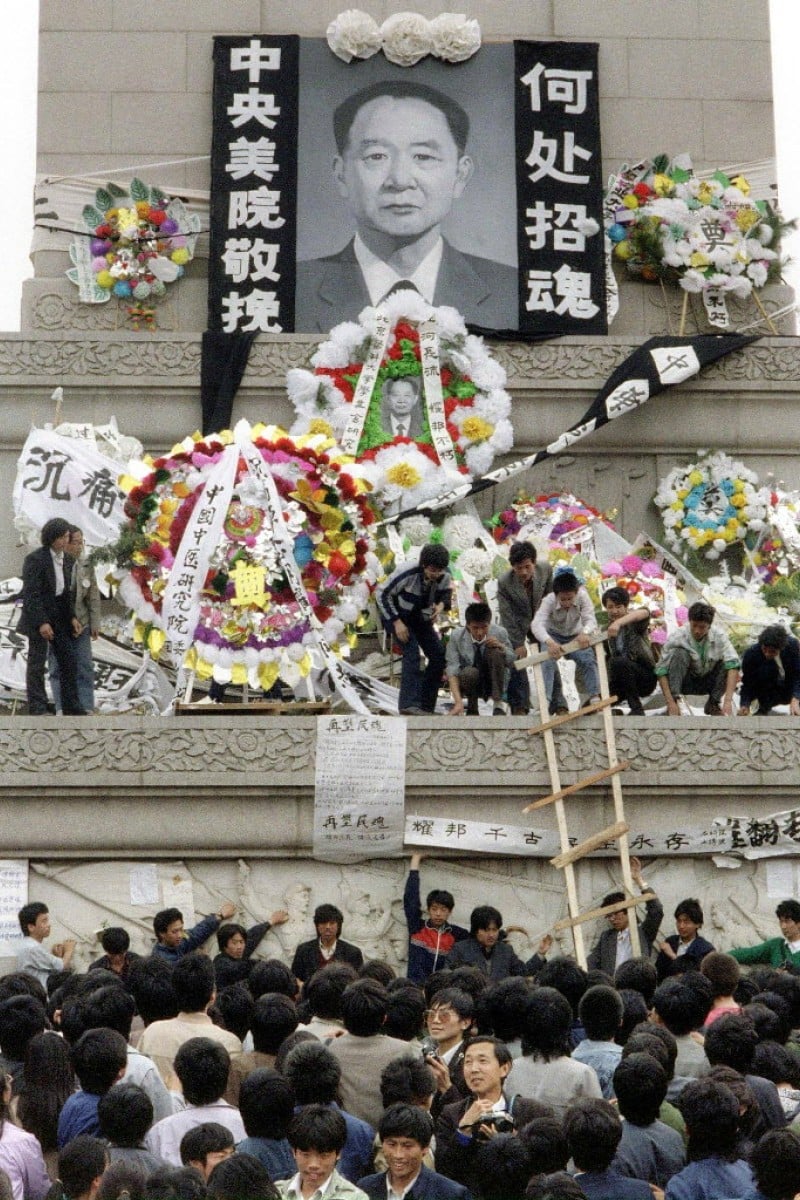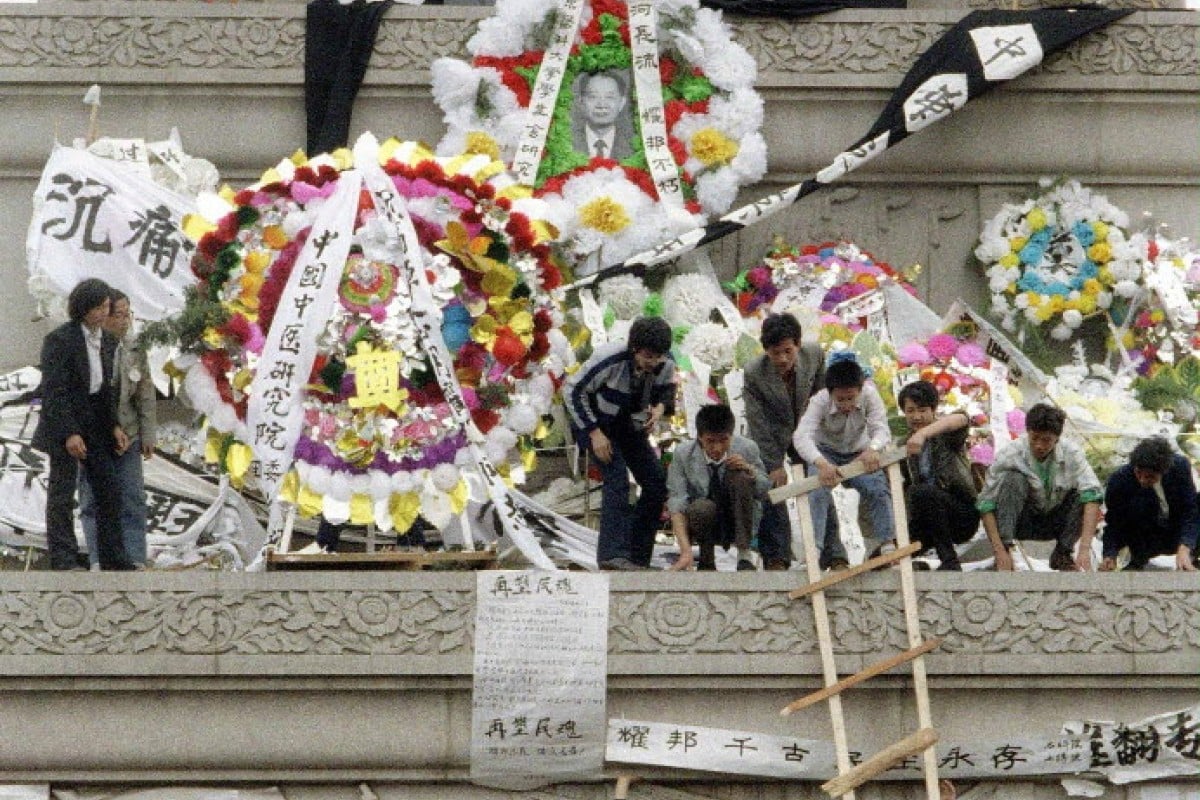
How the death of Chinese statesman Hu Yaobang led to the bloody crackdown at Tiananmen Square
- An economic reformer and close ally of Deng Xiaoping, Hu led the efforts to launch China into capitalism
- Here's what you need to know about the death that led to this terrible incident
 Students in Tiananmen Square, Beijing, lay wreaths in front of Hu Yaobang's picture, on April 19, 1989.
Students in Tiananmen Square, Beijing, lay wreaths in front of Hu Yaobang's picture, on April 19, 1989.Hu Yaobang died more than 30 years ago, but his impact is still being felt in China.
Hu had a heart attack during a Politburo meeting, then died a week later, on April 15, 1989. An economic reformer and close ally of Deng Xiaoping, Hu had led the efforts to launch China into capitalism and to recover from the years under Mao Zedong. But hard-liners ousted him as general secretary of the Communist Party in 1987, accusing him of “bourgeois liberalisation” that contributed to student protests that year.
When Hu died at the age of 74, more than 100,000 students took to the streets of Beijing to mourn him and called for a more transparent system and an end to corruption - two causes championed by Hu. In Tiananmen Square, the students hung a large black-and-white banner featuring his portrait and calling him “China’s spirit,” Ilaria Maria Sala wrote in an account of those events for Quartz.
Eleven days after his death, the People’s Daily, the news organisaton of the Communist Party, ran an editorial accusing the protesters of wanting to overthrow the government. The students were enraged, saying they loved their country and wanted to make it better. Even bigger protests ensued, leading to the hunger strikes and sit-in in Tiananmen and the massacre on June 4.
A beginner's guide to the Tiananmen Square incident
Hu - who was 1.52 metres tall and wore western-style suits and ties - was so revolutionary in his thinking that he once suggested that the Chinese use knives and forks, saying that sticking chopsticks into shared bowls would spread disease.
To mark the anniversary of his death in 2019, a small, private ceremony was held at Hu’s former residence in Beijing. His son, Hu Dehua, was joined by Du Daozheng, who was a member of reformist circles and the former publisher of the liberal journal Yanhuang Chunqiu, local papers reported.
“Until Comrade Hu Yaobao left the world 30 years ago, he had remained a faithful and conscientious old friend to all the ordinary people,” Du wrote on a scroll at the ceremony. “He had remained committed to science and democracy and set a great example for future generations in this respect.”
About 20 people, including Hu’s sons, travelled to the Huyaobang Cemetery in Gongqingcheng (literally “Communist Youth League City”) in Jiangxi province for an exhibition to “preserve Red memory”, according to local reports. Police officers kept a close watch on them.
Tiananmen crackdown to be left off HK school syllabus
The anniversary was also carefully monitored online.
The verified Weibo account of the Hu Yaobang history documentation project posted photos of flowers and bowing mourners at the cemetery. “The great man has gone but the spirit will always be with Gongqingcheng,” said a post on the official Weibo account of Nanchang University’s Science and Technology School.
The Youth League Committee of Hainan University also posted. “Today marks the 30th anniversary of Hu Yaobang’s death. The man has gone, but his cause is left for the later generations to develop,” the post said. “We hope the younger generation can continue with the past and open up the future in honour of the older generation, and our cause of reform will never stop!”
But not everyone could comment. The hashtag #胡耀邦逝世三十周年 (“30th Anniversary of Hu Yaobang’s Passing”) was deleted on Weibo.
Many young mainland Chinese will know little, if anything, about Hu’s role. Most references to events related to Tiananmen Square are scrubbed from China’s history textbooks, and all discussion of it is censored on the Chinese internet.
But Hu’s legacy has become more complicated for the party in recent years.
The state-run People’s Publishing House released a collection of his speeches and works at the end of 2015. His works showed his ideas for China’s development and his “noble character, just and clean work style”.
At the end of last year, a statue of Hu was erected in his hometown in Liuyang, in the southern Chinese province of Hunan. This came amid the celebrations of the 40th anniversary of China’s “reform and opening up” policy, launched by Deng.
This is partly because Hu’s campaign against corruption is helpful now for Chinese President Xi Jinping, who has led a campaign against corruption that has led to the imprisonment of many people since he took power.
Why Tiananmen should not be forgotten
But it is also because Hu reportedly played a critical role in rescuing Xi’s father, fellow party veteran and vice-premier Xi Zhongxun, when he was cast into the political wilderness by Mao, wrote South China Morning Post columnist, Cary Huang.
“That is probably why Xi spoke so highly of Hu in his 2015 speech to commemorate the 100th anniversary of the late reformer’s birth,” Huang wrote. “Xi praised Hu as a time-tested and loyal communist, a great statesman and a prominent leader of the party - despite the current president having in many ways differences in temperament, personality, ideology and policies.”
But reminding Chinese today of Hu’s legacy is a risky business, Huang continued. It “is a reminder to many Chinese of the political reforms which have stalled since his death”.
